 Melissa Anderson
Melissa Anderson
Habeas coitus: Yorgos Lanthimos’s new film about a Frankensteinian
lady-baby misses its feminist mark.
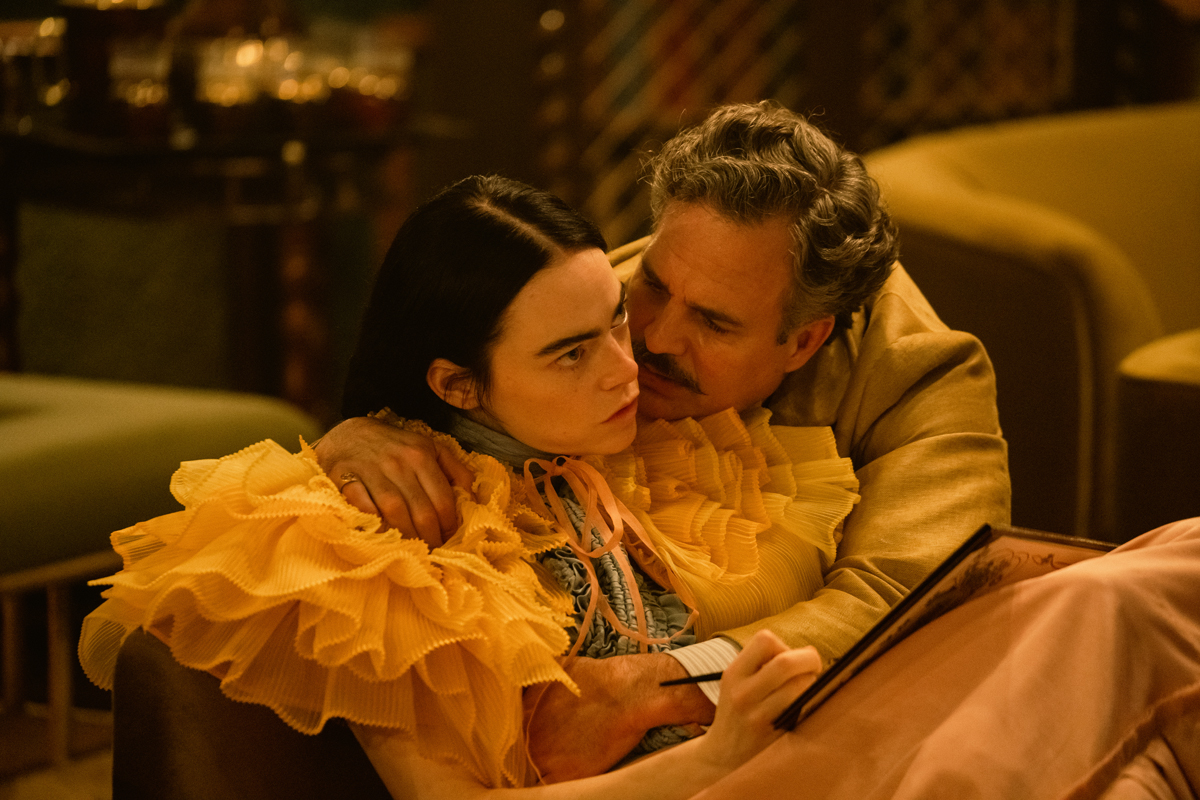
Emma Stone as Bella Baxter and and Mark Ruffalo as Duncan Wedderburn in Poor Things. Courtesy Searchlight Pictures. Photo: Atsushi Nishijima. © Searchlight Pictures.
Poor Things, directed by Yorgos Lanthimos, now playing in theaters
• • •
An unholy act of surgery, Yorgos Lanthimos’s Poor Things sloppily stitches together Frankenstein, erotomania, steampunk aesthetics, and feeble feminism. Liberally adapted from Alasdair Gray’s 1992 novel of the same name—about the exploits of a woman named Bella Baxter, resurrected through ghastly means by a mad doctor in the late nineteenth century—Lanthimos’s film tosses aside many of the book’s more intriguing concerns (namely, Bella’s deepening political commitments) to give more screen time to interminable montages of the heroine in frenzied coitus.
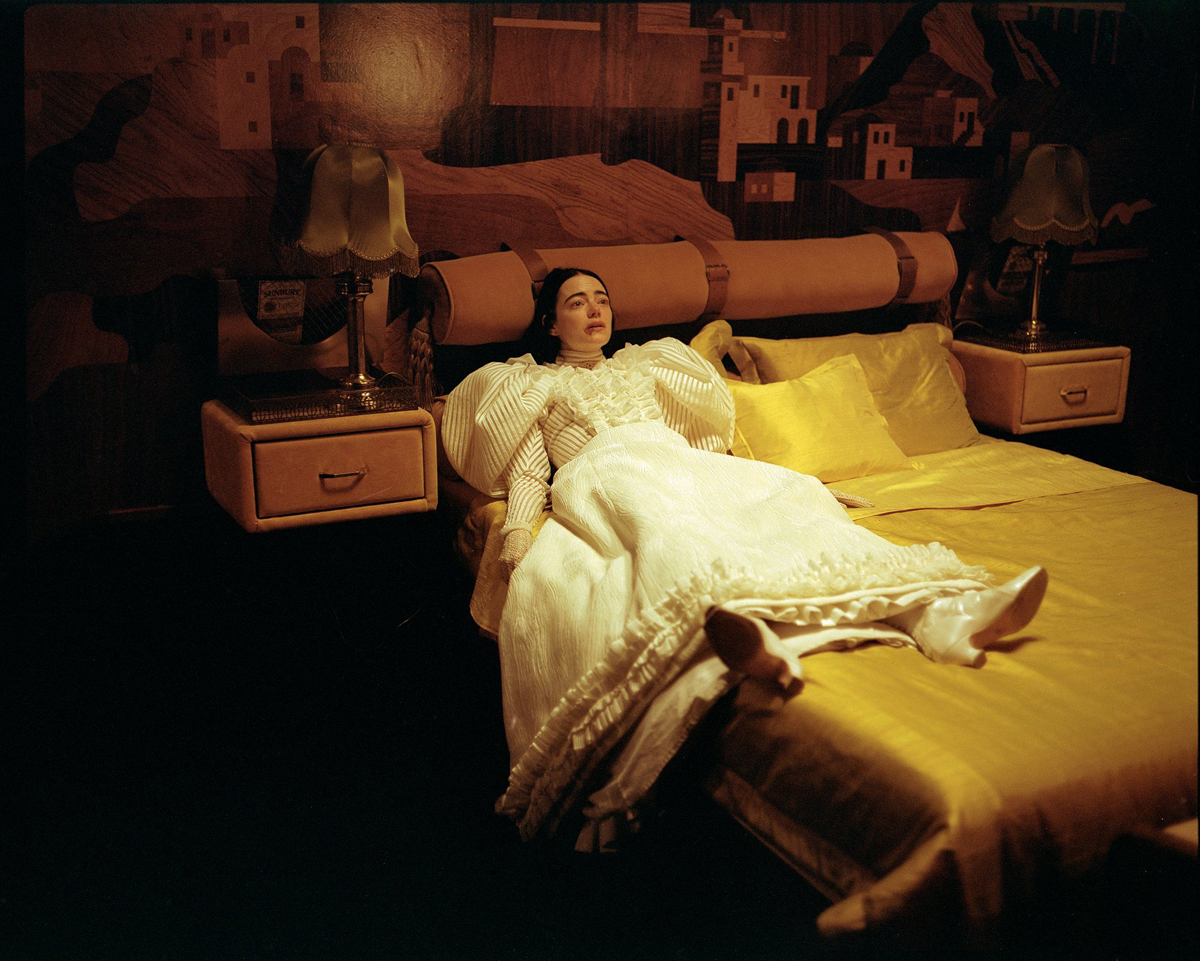
Emma Stone as Bella Baxter in Poor Things. Courtesy Searchlight Pictures. Photo: Yorgos Lanthimos. © Searchlight Pictures.
Poor Things, Lanthimos’s eighth feature, is his second period piece, following The Favourite (2018); the idiosyncrasies, stylistic and otherwise, of the earlier film are multiplied tenfold in his latest. While The Favourite confined itself to the reign of Queen Anne in the first years of the 1700s, but threw in a few anachronistic flourishes, Poor Things offers a more strenuous mélange of set design, its Victorian-era setting daubed with German Expressionism and Wellsian retrofuturism. Poor Things, courtesy of returning cinematographer Robbie Ryan, also continues its predecessor’s use of fish-eye lenses—formal frippery expanded here to include iris shots and other distorting camera tricks, all to increasingly pointless effect.

Emma Stone as Bella Baxter in Poor Things. Courtesy Searchlight Pictures. Photo: Atsushi Nishijima. © Searchlight Pictures.
Both films feature the same screenwriter, Tony McNamara, and a star, Emma Stone, promoted from the supporting role she played in The Favourite to the lead, her Bella appearing in nearly every scene in Poor Things. The word Stone and her costars uttered most frequently in the earlier film was cunt. That term, however scabrous, at least has the benefit of being monosyllabic—unlike the repeated wearisome phrases and sentences related to sexual pleasure that are clotted with Bella’s odd diction.
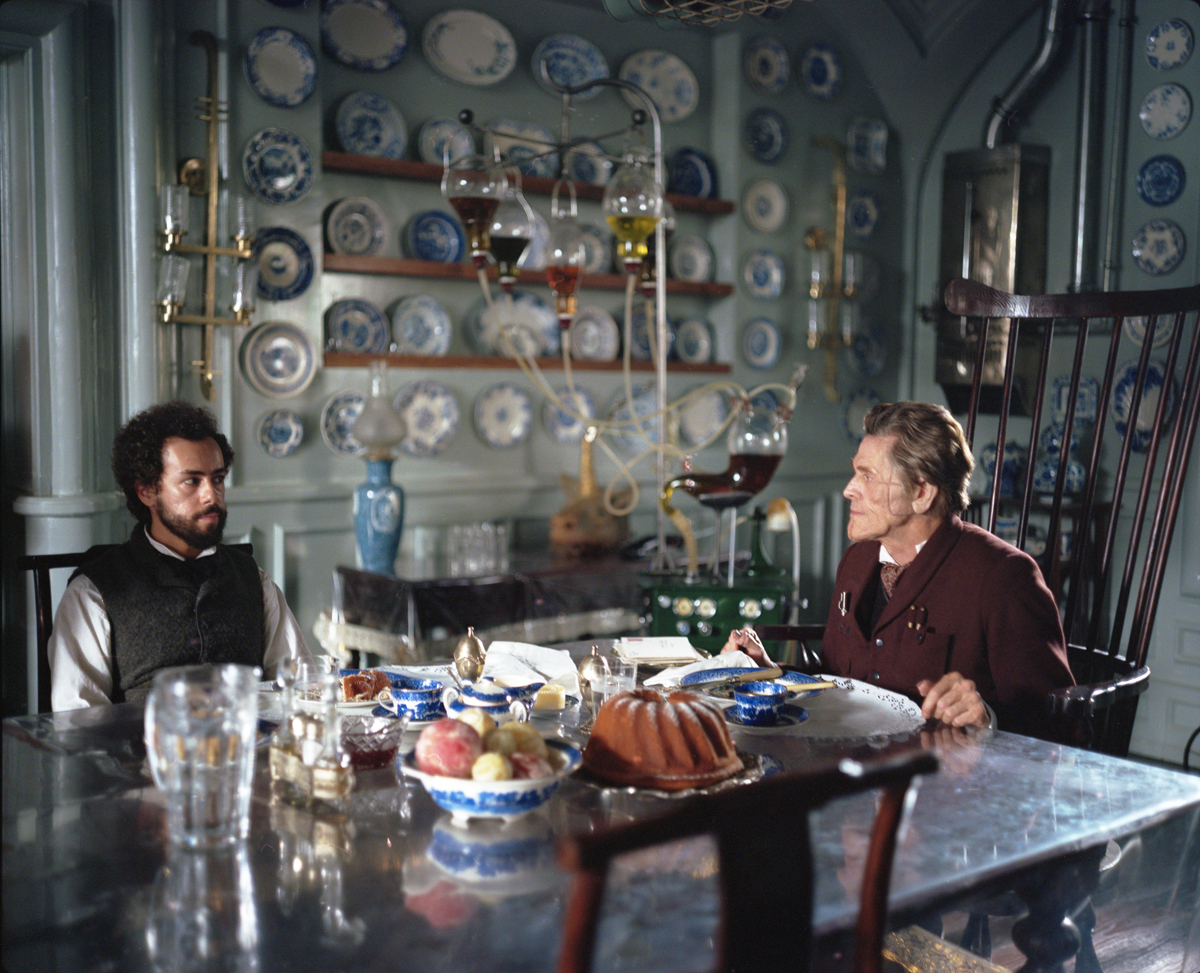
Ramy Youssef as Max McCandles and Willem Dafoe as Dr. Godwin Baxter in Poor Things. Courtesy Searchlight Pictures. Photo: Yorgos Lanthimos. © Searchlight Pictures.
Bella speaks so strangely as the result of a bizarre experiment carried out by Dr. Godwin Baxter (Willem Dafoe), a physician grotesquely deformed by the sick laboratory tinkerings of his own scientist father. After a heavily pregnant woman who had leapt to her death in a river is brought to Godwin’s London surgery (her identity is revealed late in the film), he reanimates her by replacing her brain with that of her fetus. Christened Bella, she is a discomfiting hybrid, a putative adult with the id and motor and language skills of an infant. The lady-baby—her Kahlo-esque eyebrows and curtain of butt-grazing black hair further heightening the discordance between appearance and behavior—pounds piano keys, smashes plates, pisses on the floor, babbles, and toddles. As her aptitude develops, her echolalia now supplanted by pidgin English and a cloying insistence on referring to herself in the third person (“Bella want to look at world”), Godwin—called “God” by his creation—hires medical student Max McCandles (Ramy Youssef) as his assistant, tasked with recording Bella’s progress.
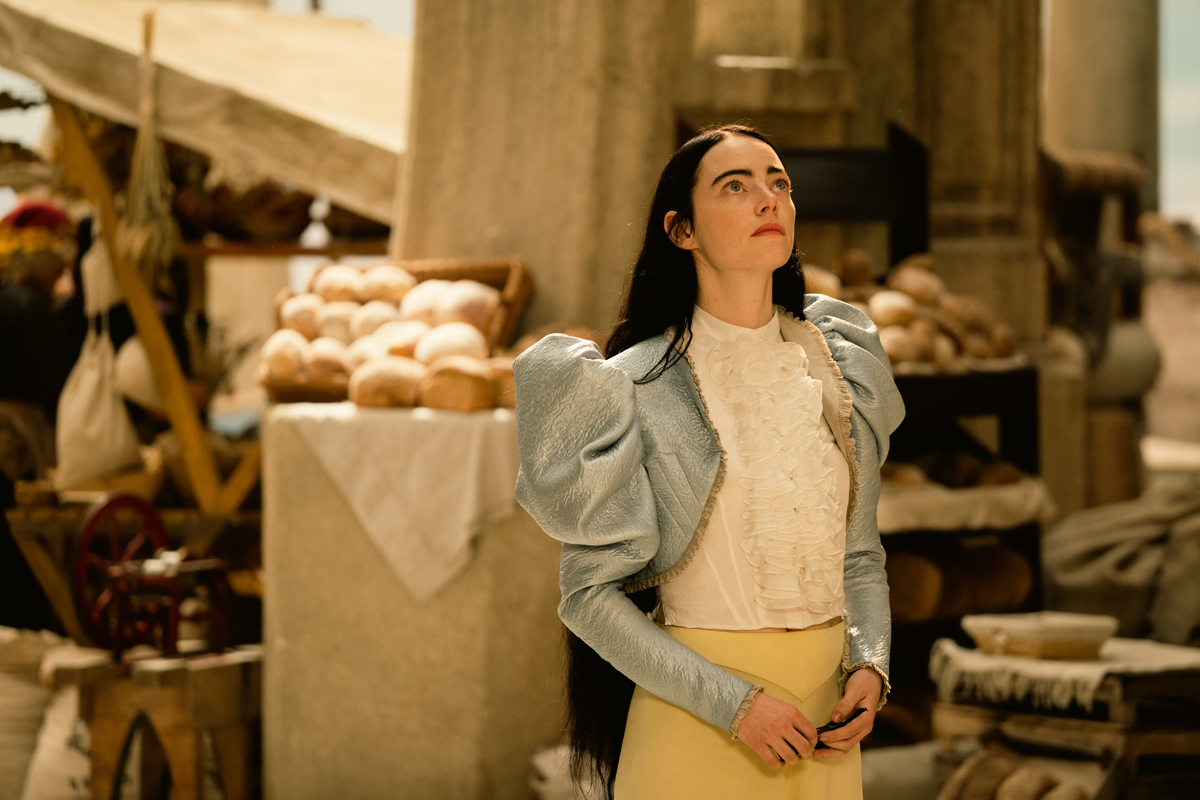
Emma Stone as Bella Baxter in Poor Things. Courtesy Searchlight Pictures. Photo: Atsushi Nishijima. © Searchlight Pictures.
Her advancement leads to the discovery of masturbation, or, per the now-orgasmic heroine’s twee syntax, “working on myself to get happiness.” As she moves from self-pleasuring to alloeroticism, her language grates even further. “Let us touch each other’s genital pieces,” she proposes to a scandalized Max. “Now you must lie down on top of me and do more furious jumping,” she commands Duncan Wedderburn (Mark Ruffalo), a debauched attorney who, wildly aroused by this carnally ravenous woman, takes her to Lisbon, with Godwin’s reluctant blessing. (None of these expressions appear in Gray’s book. The Scottish writer peppered his novel with euphemisms boasting a certain Chaucerian charm, such as “middle footless leg” and “loving groove”; McNamara’s bawdy coinages, in contrast, seem ChatGPT-generated.)

Emma Stone as Bella Baxter in Poor Things. Courtesy Searchlight Pictures. © Searchlight Pictures.
Once Bella and Duncan are in the Portuguese capital, the film shifts from black-and-white to retinal-taxing neon pastels, the flagrantly artificial backdrops suggesting the literalization of the lyrics to “Lucy in the Sky with Diamonds.” In Lisbon she discovers oysters, pastéis de nata, and a host of different sexual positions with Duncan, their variegated rutting presented as a series of rapid cuts, scored to the sounds of her operatic climaxing. Soon, even satyric Duncan grows exasperated by this insatiable woman, especially by her blithe disregard for convention. “I must go punch that baby,” she announces at a restaurant, irked by the wailing of a tyke at a nearby table.
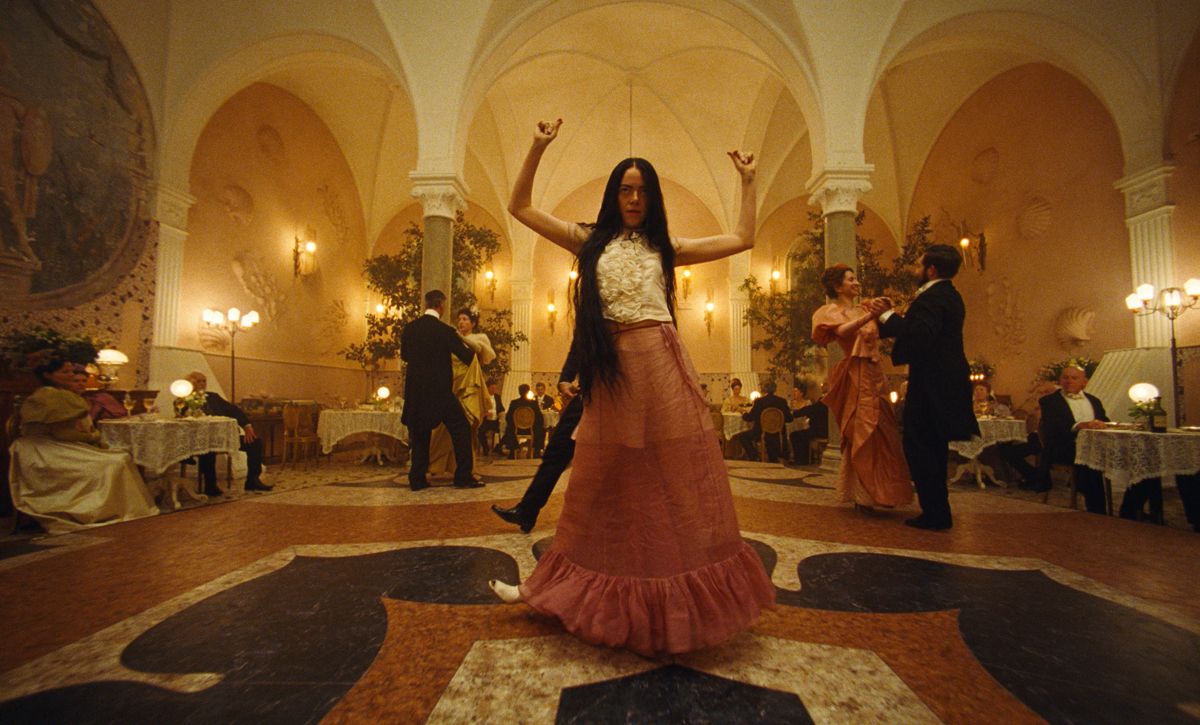
Emma Stone as Bella Baxter in Poor Things. Courtesy Searchlight Pictures. © Searchlight Pictures.
That’s just one of countless examples of Bella’s lack of filters played for smug easy laughs, typifying this film’s relentless pandering. Rollicking, if occasionally depleting, Gray’s novel at the very least envisions Bella as a stalwart of particular era-specific causes, chiefly Fabianism and the nascent birth-control movement, giving her real political heft. Lanthimos’s movie, in contrast, presents Bella as a much more pliable protagonist; her wild tale is transformed into a self-actualizing woman’s journey designed to echo various strands of twenty-first-century lifestyle feminism, an aim that often misses its mark. Scenes of Bella’s abundant copulation, which repeat during her time as an employee at a brothel in Paris, are meant to uphold her as an avatar of sex-positivity. Yet filmed so unimaginatively, these episodes call to mind the sexbots created by the most mercenary character in Jeanette Winterson’s Frankisstein, her 2019 gloss on Mary Shelley’s classic. As Bella’s quest for knowledge grows beyond the sensual, she is puzzled by the lofty texts she is now consuming. Putting down a volume of Emerson, she asks aloud, “Why doesn’t he speak of women? Perhaps he doesn’t know any.” Her guileless observation, deployed to flatter the contemporary viewer still railing against the dead white male canon, instead lands as a thudding inanity.
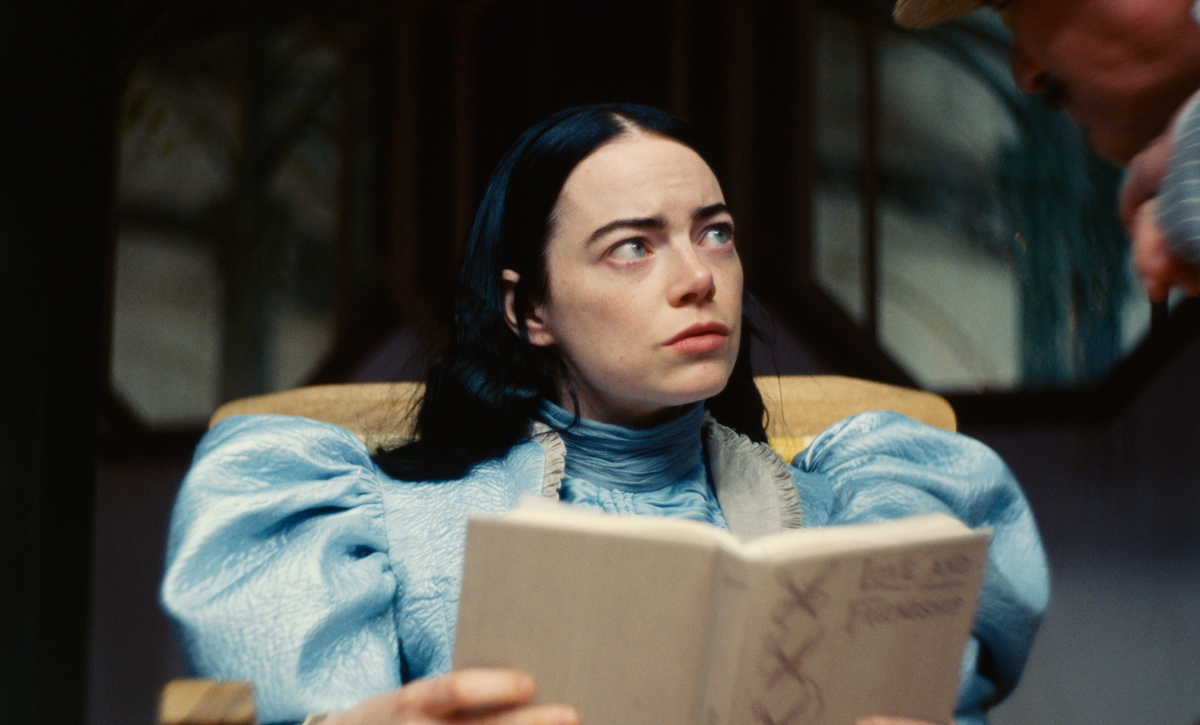
Emma Stone as Bella Baxter in Poor Things. Courtesy Searchlight Pictures. © Searchlight Pictures.
The bumptious Poor Things reaches the point of unendurability owing to how broadly some members of the cast perform their roles. A certain amount of clamor and tumult is to be expected in this kind of rowdy fantasia, but Ruffalo especially, perhaps to compensate for his inept Received Pronunciation, shamelessly mugs, his reaction shots those of a man who has just been tased. Stone, whose talent for sly, precise responses is currently on view in the Showtime series The Curse, has no choice in Poor Things but to be mammoth in gesture and affect—in a film for which too much is never enough.
Melissa Anderson is the film editor of 4Columns and the author of a monograph on David Lynch’s Inland Empire from Fireflies Press.